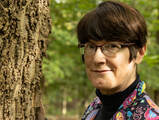| I’ve been reading Naseem Jamnia’s author newsletter for months. When I learned she was participating at WisCon46 (the feminist SFF convention over Memorial Day weekend), I was inspired to get her debut fantasy novel, The Bruising of Qilwa from my local library. The story is a medical mystery involving a magical “blood-bruising” plague. The narrator, Firuz, is a transgender healer with “blood” magic. Firuz is also a refugee trying to support their family by working at the local clinic. |
The author uses the singular they pronoun (they, them) throughout the story to emphasize Firuz’s gender-neutrality, but I wondered why the book wasn't written in first-person (I, me) since the entire tale is told from Firuz’s point of view. There are other interesting pronouns briefly employed, reminding me of Charlie Jane Anders’ Love Might Be Too Strong a Word, which remains my favorite pronoun tour-de-force.
The intriguing magic system as described by Firuz: “Energy is constantly flowing in the universe…When we learn magic, we’re growing the muscle, so to speak, that allows us to access this energy. Anyone can learn, but not everyone has the patience or aptitude. That’s why we use the general term magic user, but adept for those who train.”
The Bruising of Qilwa is a short novella (179 pages) with a breadth of themes: found family, loyalty, magic responsibility, the plight (and resilience) of refugees, ethnic prejudice, gender identity, and the nature of colonial power. This breadth gives the storyworld heft, but strained the dialogue and plot in some places. There are a number of non-English words, most of which are defined in context, but many occur so infrequently, they seemed sprinkled in for exotic flavor rather than serving a story purpose.
Despite its limitations, the book has undeniable heart and more nuance than a typical Young Adult fantasy--and it's a joy to read a trans character whose gender identity is not a source of angst.
Be sure to read the author's afterward about how their experiences as a Persian-American shaped the story.
The intriguing magic system as described by Firuz: “Energy is constantly flowing in the universe…When we learn magic, we’re growing the muscle, so to speak, that allows us to access this energy. Anyone can learn, but not everyone has the patience or aptitude. That’s why we use the general term magic user, but adept for those who train.”
The Bruising of Qilwa is a short novella (179 pages) with a breadth of themes: found family, loyalty, magic responsibility, the plight (and resilience) of refugees, ethnic prejudice, gender identity, and the nature of colonial power. This breadth gives the storyworld heft, but strained the dialogue and plot in some places. There are a number of non-English words, most of which are defined in context, but many occur so infrequently, they seemed sprinkled in for exotic flavor rather than serving a story purpose.
Despite its limitations, the book has undeniable heart and more nuance than a typical Young Adult fantasy--and it's a joy to read a trans character whose gender identity is not a source of angst.
Be sure to read the author's afterward about how their experiences as a Persian-American shaped the story.


 RSS Feed
RSS Feed